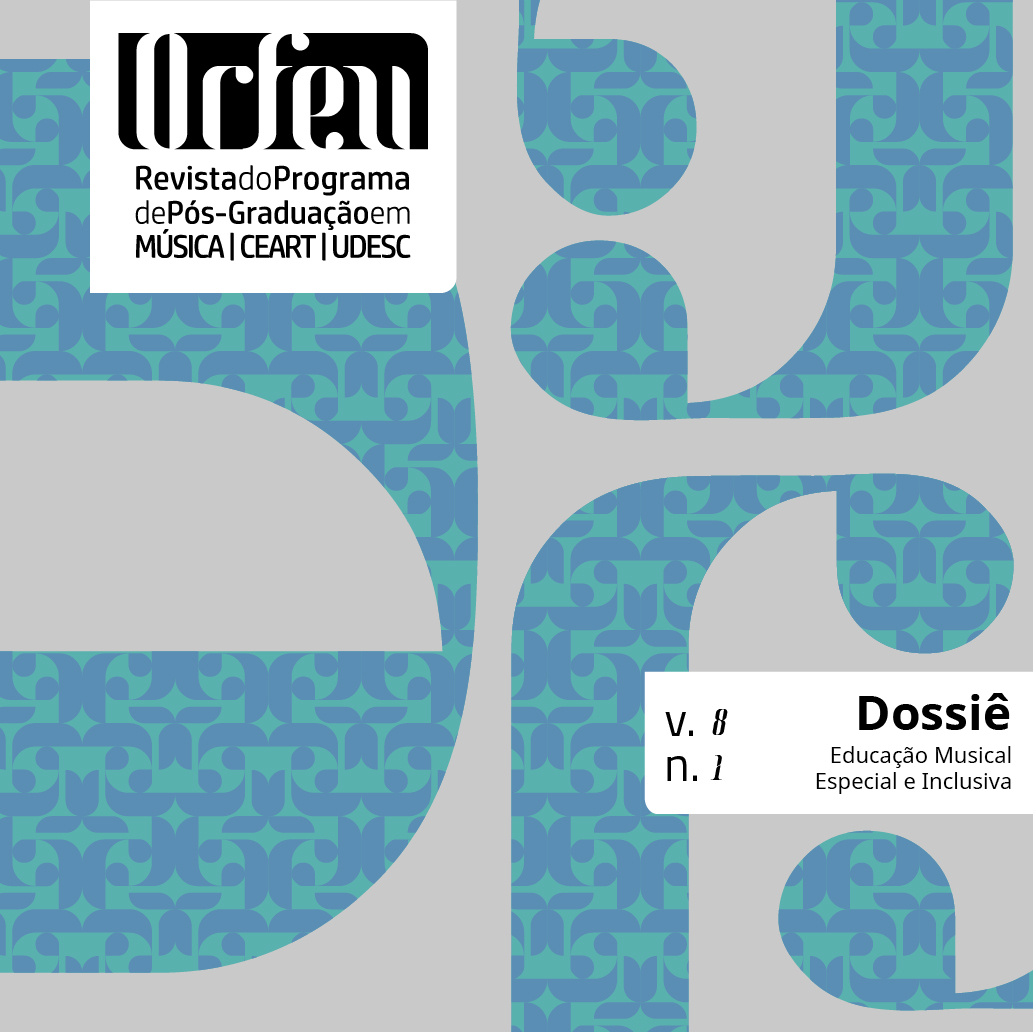Autorregulação da aprendizagem e memorização musical
DOI:
https://doi.org/10.5965/2525530408012023e0202Palavras-chave:
autoregulação, aprendizagem, memorização musical, Teoria Social CognitivaResumo
O processo de aprender requer o engajamento dos sujeitos envolvidos nas diversas situações em que estão inseridos. As singularidades e subjetividades que estão entrelaçadas nestes percursos evidenciam as particularidades e complexidades que o processo da aprendizagem exige. Quando trazemos a condução do aprender para a execução de um instrumento musical, sobretudo de estudantes, não podemos esquecer a demanda que essa atividade exige, a saber, o desenvolvimento de várias competências cognitivas, metacognitivas, motivacionais e comportamentais. A teoria da autorregulação a partir do paradigma sócio-cognitivo tem sido de contribuição para o âmbito educacional, sobretudo na compreensão e condução mais assertiva dos processos de aprendizagem musical. A partir dos subprocessos autorregulatórios, este artigo se propõe a trazer algumas discussões a partir de uma tese de doutorado que teve como objetivo principal investigar como estudantes engajados em orquestras infanto-juvenis autorregulam suas práticas musicais e seu envolvimento na aprendizagem da memorização musical. Para isso, foram realizados dois estudos. O Estudo I foi uma survey que buscou dar uma visão macro sobre como músicos de orquestras infanto-juvenis portuguesas e brasileiras (170 músicos entre 11 a 17 anos de idade) se envolvem na prática e na memorização musical. O Estudo II foi um estudo de caso exploratório, descritivo e explicativo que procurou compreender os processos autorregulatórios de aprendizagem na prática e memorização musicais (20 músicos entre 12 a 17 anos de idade). Os resultados apontam o envolvimento dos estudantes músicos ao escolherem, aplicarem e adaptarem as estratégias cognitivas necessárias no processo de suas práticas. Eles revelaram que, mesmo quando os jovens músicos desconhecem as estratégias de memorização empregadas por músicos experientes, algumas das estratégias que utilizam são semelhantes. Revelaram, ainda, lacunas existentes no ensino do treinamento autorregulatório em relação à prática e à memorização musicais.
Downloads
Referências
AZZI, R.G. Autorregulação em Música: discussão à luz da Teoria Social Cognitiva. Modus, Belo Horizonte, v. 10, n. 17, p. 9-19, 2015.
AZZI, R. G.; BASQUEIRA, A. P. Aprendizagem observacional na visão da Teoria Social Cognitiva. In: BORUCHOVITCH, E.; AZZI, R. G.; SOLIGO, A. (org.). Temas em Psicologia Educacional: contribuições para a formação de professores. Campinas: Mercado de Letras, 2017. p. 13-36.
BANDURA, A. Social foundation of thought and action: a social cognitive theory. Englewood Clifs, NJ: Prentice Hall, 1986.
BANDURA, A.; AZZI, R. G.; POLYDORO, S. A. J. Teoria Social Cognitiva: conceitos básicos. Porto Alegre: Artmed, 2008.
CARVER, C. S. Self-Regulation of Action and Affect. In: BAUMEISTER, R. F.; VOHS, K.D. (ed.). Handbook of Self-Regulation: Research, Theory and Applications. New York: The Guilford Press, 2004. cap. 4, p. 13-39.
CHAFFIN, R. Estratégias de recuperação da memória na execução musical: aprendendo Clair de Lune. Em Pauta, Porto Alegre, v. 20, n. 34/35, p. 187-221, 2012.
CHAFFIN, R.; IMREH, G.; CRAWFORD, M. Practicing perfection: memory and piano performance. Mahwah: Erlbaum, 2002.
CHAFFIN, R.; LOGAN, T. R.; BEGOSH, K. T. A Memória e a Execução musical. Em Pauta, Porto Alegre, v. 20, n. 34/35, p. 223-244, 2012.
GERBER, Daniela Tsi. A memorização musical através dos guias de execução: um estudo de estratégias deliberadas. 2012. Tese (Doutorado) – Universidade Federal do Rio Grande do Sul, Porto Alegre, 2012.
GERLING, C. M. P.; SANTOS, R. A. T. dos. How do undergraduate piano students memorize their repertoires? International Journal of Music Education, v. 35, p. 60-78, 2017.
LEE, S. An Investigation into how young orchestral musicians engaje in instrumental practice and memorization. 2017. 90 f. Dissertation (Master) – Royal College of Music, London, 2017.
LISBOA, T; CHAFFIN, R.; DEMOS, A. P. Recording thoughts while memorizing music: a case study. Frontiers in Psychology, v. 5, 23 Jan. 2015.
POLYDORO, S. A. J.; AZZI, R. G. Autorregulação: aspectos introdutórios. In: BANDURA, A.; AZZI, R. G.; POLYDORO, S. A. J. (org.). Teoria Social Cognitiva: conceitos básicos. Porto Alegre: Artmed, 2008. cap. 7, p. 149-164.
SCHUNK, D. H.; ZIMMERMAN, B. J. Social origins of self-regulatory competence. Educational Psychologist, v. 32, p. 195-208, 1997.
SILVA, D. B. da. Guias de execução e memorização, estudo multicaso com violinistas pós-graduados. 2017. Tese (Doutorado) – Universidade Federal do Rio Grande do Sul, Porto Alegre, 2017.
SPINELLI, J.; SANTOS, R. A. T. dos. Memória e imagética na prática violonística. Opus, Belo Horizonte, v. 25, p. 1-29, 2019.
STERNBERG, R. J. Memória: modelos e métodos de pesquisa. In: STERNBERG, R. J. Psicologia Cognitiva. Trad. Anna Maria D. L. e Roberto Galman. 5. ed. São Paulo: Cengage Learning, 2016. cap. 5, p. 153-188.
STERNBERG, R. J. Processos Mnésicos. In: STERNBERG, R. J. Psicologia Cognitiva. Trad. Anna Maria D. L. e Roberto Galman. 5. ed. São Paulo: Cengage Learning, 2016. cap. 6, p. 189-224.
VASCONCELOS, M. C. S. Processos autorregulatórios e aprendizagem de prática e memorização em orquestras infanto-juvenis. 224 f. il. 2020. Tese (Doutorado) – Escola de Música, Universidade Federal da Bahia, Salvador, 2020.
VOHS, K. D.; BAUMEISTER, R. F. Understanding Self-Regulation: An Introduction. In: BAUMEISTER, R. F.; VOHS, K. D. (ed.). Handbook of Self-Regulation: Research, Theory and Applications. New York: The Guilford Press, 2004. p. 1-12.
WILLIAMON, A. The value of performing from memory. Psychology of Music, v. 27, p. 84-95, 1999.
WILLIAMON, A.; EGNER, T. Memory structures for encoding and retrieving a piece of music: an ERP investigation. Cognitive Brain Research, v. 22, p. 36-44, 2004.
ZIMMERMAN, B. J. A Social Cognitive view of Self-Regulated Academic Learning. Journal of Educational Psychology, v. 81, n. 3, p. 329-339, 1989.
ZIMMERMAN, B. J. From Cognitive Modeling to Self-Regulation: A Social Cognitive Career Path. Educational Psychologist, v. 48, n. 3, p. 135-147, 2013
Downloads
Publicado
Como Citar
Edição
Seção
Licença
Copyright (c) 2023 Mônica Vasconcelos, Diana Santiago

Este trabalho está licenciado sob uma licença Creative Commons Attribution 4.0 International License.






